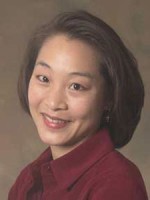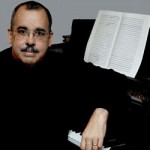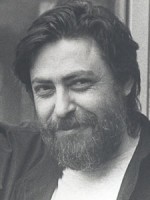Title
Though the New Juilliard Ensemble’s first concert at Juilliard takes place this month, our 15th season actually got under way this summer, when members and several recent alumni of the ensemble were featured in Summergarden, the outdoor concert series at the Museum of Modern Art that Juilliard has shared with Jazz at Lincoln Center since 2005, when the series resumed as MoMA opened its new building. The programs consisted entirely of music never heard in New York, drawn from all over the world.
Body
For some time we thought that this year’s Summergarden concerts might have to be transplanted indoors, because of the space occupied by two mammoth Richard Serra sculptures installed in the garden for the artist’s retrospective. But we were able to accommodate almost as many listeners as usual by deft placement of the chairs and could even use some space that had been unavailable previously because all the small sculptures (such as Picasso’s beautiful goat) were removed for the duration of the Serra show. Though the seating area was a bit oddly shaped, part of the audience got to sit under the lovely trees that grow along the garden wall. It was an idyllic spot to listen to music—even if the fall of evening induced mobs of sparrows to begin singing at the top of their tiny lungs, drowning out all music softer than mezzo piano!
We ended up with very large crowds again, averaging around 550 per concert. It was a joy to see many young people, and a much more racially diverse audience than usually appears at new-music concerts in standard concert halls. Some have suggested that the greater diversity can be explained by the lack of admission charge or tickets. If so, the old story that no one is interested in contemporary music may have to be replaced by the idea that people will take a chance on a lot if it doesn’t cost them anything. If they enjoy the music, so the wisdom goes, they’ll be willing to buy a ticket in the future. Certainly there is something to be said for free admission, so that people with little time or simple curiosity can come to hear part of a concert and leave. That is one of the principles behind free admission in British museums and public galleries. I also think that the arresting beauty of the MoMA sculpture garden at night is a tremendous attraction, as long as the weather is not intolerably hot and humid. (Everyone welcomes a nice breeze, except the performers who have to battle with blowing pages.)
Of course, our performances at Juilliard are also free, even if they require tickets. And they generally draw well. The New Juilliard Ensemble’s normal audience is about as large as one sees in New York for new music. But even more would be better, in such a big city. The biggest problem for everyone presenting new music in New York is that there are so many of us. New York sometimes has more concerts of new music in one day than many large cities have in an entire year. The atmosphere of activity and energy is great, but the audience becomes fragmented. I tend to believe that the N.J.E. does well partly because the public loves the energy that young performers project.
Our first formal concert of the school year is on September 29 and will feature three U.S. premieres. After Roberto Sierra’s Güell Concert was premiered at a Madrid concert series in 2006, Sierra phoned to ask if I wanted the U.S. premiere. I said yes without hesitation. Many people have observed my enthusiasm for his music, which manages to be complex and delightfully accessible at the same time. I have known Sierra and his music for more than 30 years—ever since he was an assistant in the cultural affairs office at the University of Puerto Rico—and have been really excited by his stylistic development.
Another U.S. premiere, which will open the concert, is the lively Sphinx Flowers by the young Finnish composer Perttu Haapanen . The Finnish Music Information Center, which publishes most Finnish composers, is wonderful about bombarding conductors with scores. Since their composers frequently write for an instrumentation like that of N.J.E., they have a natural market in conductors like me. Sphinx Flowers arrived out of the blue (along with about a dozen other scores) and was also strongly recommended by Seppo Pohjola, whose Liebelei was a big hit on last spring’s concluding N.J.E. concert.
The third piece to be introduced to America this month is Notturno, by Dmitri Yanov-Yanovsky , the most internationally-known composer of Central Asia, a region with stunning traditional music but not many composers in Western style. Yanov-Yanovsky lives in Tashkent, the capital of Uzbekistan, and taught at the conservatory there until recently. Since he has been receiving many commissions from Europe, he was able to resign to compose full-time. Not that it made much difference economically; teachers there are paid badly, if they even receive their paychecks.
Receiving its New York premiere is Chamber Variations by Dorothy Chang, a young American who now teaches at the University of British Columbia. When I was hunting for music by young Asian-Americans for another project, Chang was highly recommended, so I asked her to send some music. A very impressive string quartet was played at Summergarden this year and enjoyed an enthusiastic response. The fifth piece on the concert is a very unusual French horn concerto by David Rakowski, an American. Rakowski, who, like Milton Babbitt, enjoys puns, has called it Locking Horns. The N.J.E.’s senior hornist, Tianxia (Taylor) Wu, a master’s student, will be the soloist. He was delighted to hear that the small repertory of horn concertos has been expanded.
On October 29, members of N.J.E. will present the second concert of the “Danube-Hudson Project,” a cooperation between Juilliard and the Franz Liszt Academy in Budapest. The program, at Paul Hall, comprises the American premieres of music by three composition students from each school. They will use the configuration of Boulez’s Dérive I (flute, clarinet, violin, cello, piano, and vibraphone), which will also be performed. The world premieres will be given in Budapest on October 21, with performers from the Liszt Academy; I’ll be conducting both concerts, and all six composers will attend both rehearsal periods and concerts. Juilliard’s composers are Kyle Blaha, a doctoral student, and Jakub Ciupinski and Edward Goldman, both master’s students. (Goldman will report on the project for the December/January issue of The Juilliard Journal.) To prepare myself for working there, I have been studying Hungarian, A fabulously beautiful language, it has an unconscionable number of suffixes and almost no memorable cognates with English or other European languages! Learning it is an experience somewhere between inspiring and masochistic—but more useful than Sudoku.









